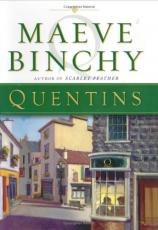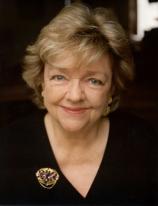Quentins
Review
Quentins
Seven or eight years ago, on a winter vacation with my mother, I
spent the plane trip and most of the first day buried in Maeve
Binchy's novel THE GLASS LAKE. Then I passed it on --- a bit
warily, for Mom preferred smart, unsentimental, uncommercial books.
"It's not great literature," I said, "but you might like it." The
next morning, looking tired, teary, and immensely gratified, she
gave it back. She had stayed up all night reading.
That's the effect Binchy seems to have on people --- millions of
them. It would be easy to slap her work with such dismissive labels
as "airplane reading" or "women's novels." Certainly the books ---
QUENTINS is her thirteenth --- are touching and warm, with few
surprises and plenty of irresistible, vulnerable,
heart-in-the-right-place characters (as well as some really
obnoxious snobs and villains). But they are also tough and
intelligent and feminist, with a lilting, very Irish sense of
language and a no-bullshit attitude toward life. (This side of
Binchy's writing reflects her personal favorites, a list that
includes such unexpected names as William Trevor, Roddy Doyle, Kurt
Vonnegut, and Elmore Leonard.)
Binchy's latest is the story of Quentins, a posh Dublin restaurant
that has already made cameo appearances in her other novels; it
features a winsome, intrepid heroine, Ella Brady, whose affair with
a married lover and its aftermath provides most of the action. But
the plot isn't awfully important here. The main thing is the
emotional generosity of the people. Some of them are old friends
from earlier books like SCARLET FEATHER, TARA ROAD and EVENING
CLASS (and if this gives the book the feeling of a high-class soap
opera, who cares?). Others are new acquaintances --- like Quentin
Barry, who is rescued, Cinderella-like, from obscurity and starts
his own restaurant; Brenda and Patrick Brennan, who run it for him;
and Patrick's younger brother Blouse, whose evolution from shy,
"slow" kid to family man, organic-vegetable expert, and all-around
mensch made me cry. Quentins itself, though, is the real
protagonist, the link that holds everything together: "There was no
other job quite as interesting," the staff agrees one day, "as
watching the human race at feeding time."
Someone once called Binchy a "quiet feminist," and I agree with
that assessment --- it's probably a major reason that women of all
sorts are drawn to her books. Her female characters are staunch
rather than furious, weary realists more than role-models, and
eventually most of them (the good ones, anyway) find love, but
there are a lot of bumps and betrayals along the way. In QUENTINS,
Mon, an Australian waitress, makes no secret of "her unerring bad
taste in men and how she had lost her heart and all her savings to
a fellow in Italy." Ella and her friend Deirdre are sympathetic:
"It was pretty much a global problem. Men were the cause of most of
the unrest and unease on the planet."
Such priceless lines aside, I didn't find QUENTINS quite as
compelling as some of Binchy's other books, mostly because it is a
bit of a pastiche: Once Ella's predicament has been established and
the history of the restaurant recounted (the two converge when Ella
comes up with the idea of making a documentary film about
Quentins), Binchy stops the action dead and diverts the novel into
a series of tales that have the flimsiest relationship to the main
plot. The stories are all set in the restaurant, and they're
supposed to be part of Ella's pitch to a foundation she's asking to
underwrite the film, but this is a pretty clunky plot device for a
woman who is usually a whiz at narrative.
QUENTINS isn't exactly suspenseful, either: We know Ella is
deceiving herself about the married boyfriend way before she does;
we know which guy she'll end up with many pages before it happens.
The amazing thing is that despite the leisurely pace and
telegraphed clues, you still want to keep reading and reading and
reading. These characters, after only a couple of hours, already
feel like family. You care desperately about what happens to
them.
QUENTINS wasn't even supposed to exist. Two years ago, Binchy
announced she was retiring; SCARLET FEATHER would be her last
novel. Legions of ardent fans ---and I'm one of them --- are very
glad that she changed her mind. When you've got a book like this to
come home to, the world is a warmer place.
Reviewed by Kathy Weissman on January 23, 2011
Quentins
- Publication Date: October 28, 2002
- Genres: Fiction
- Hardcover: 359 pages
- Publisher: Dutton Adult
- ISBN-10: 0525946829
- ISBN-13: 9780525946823





